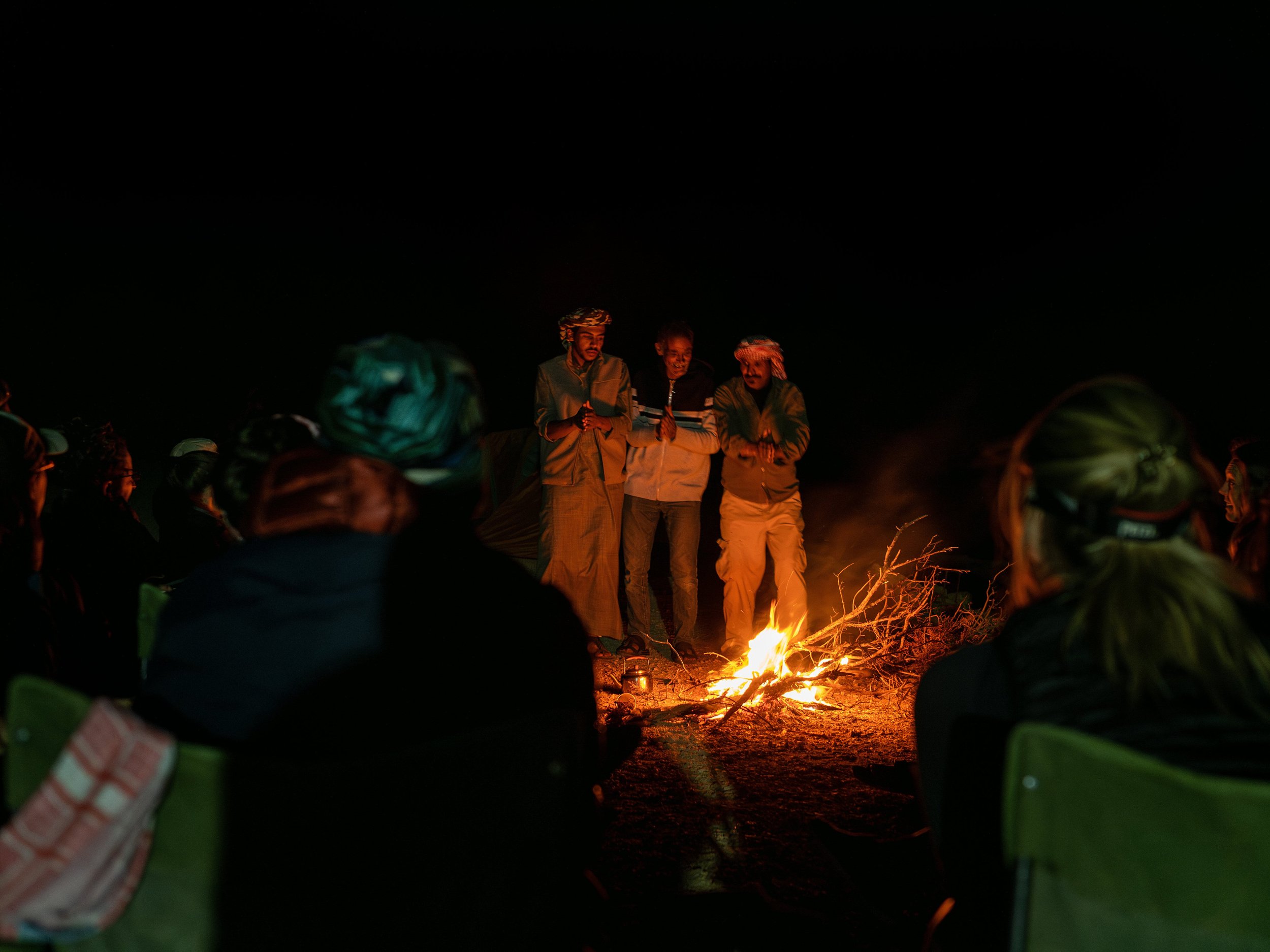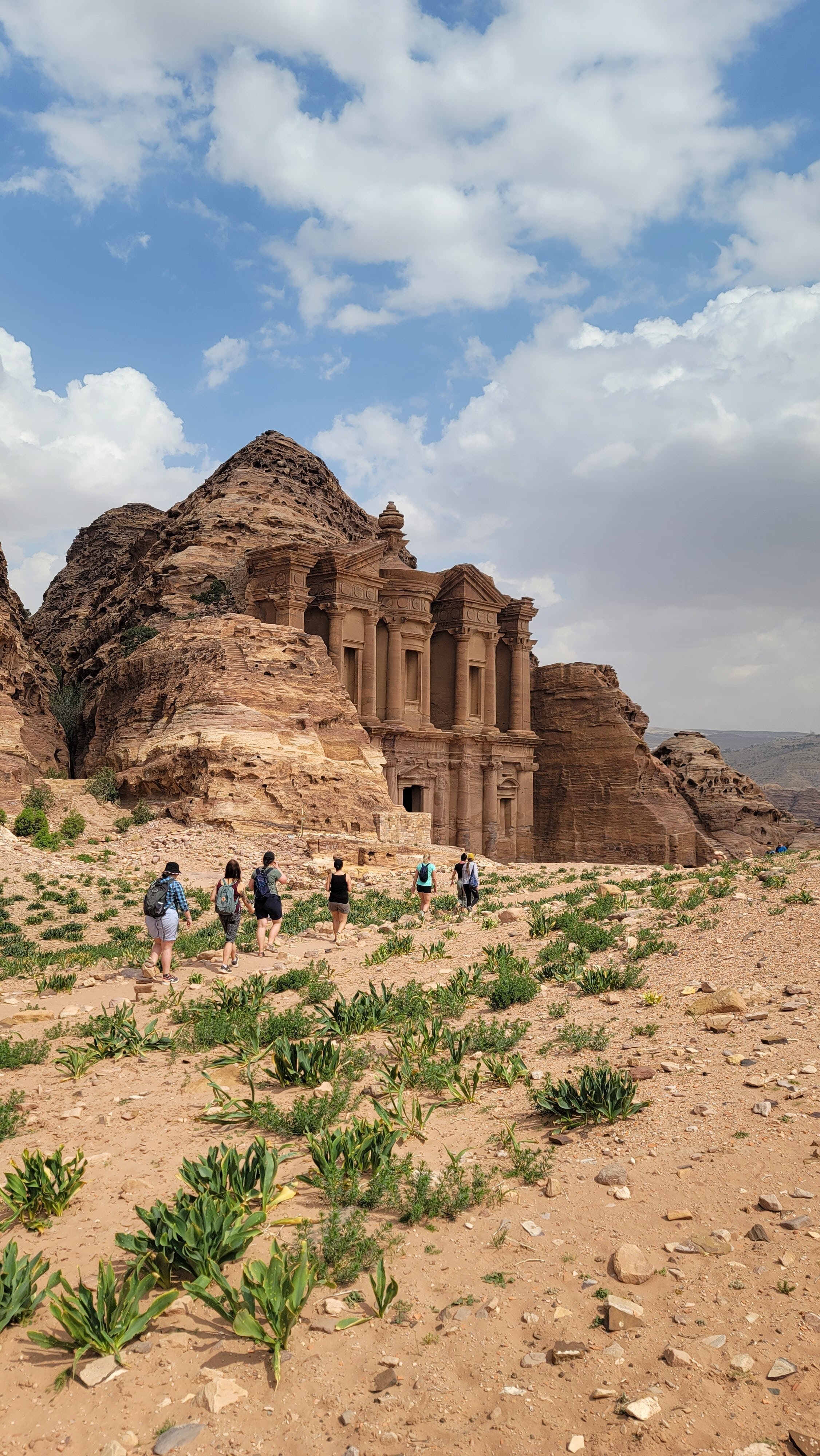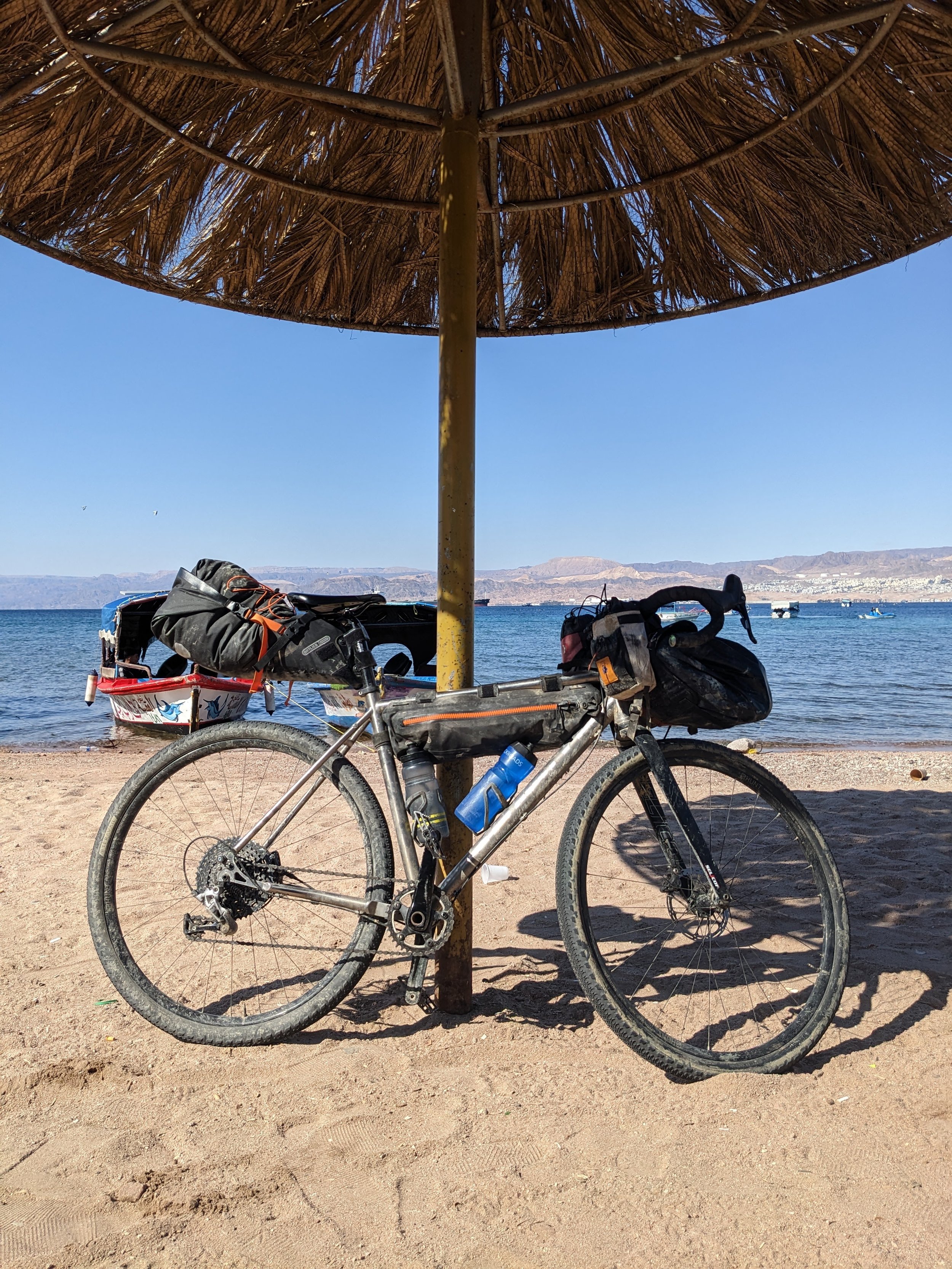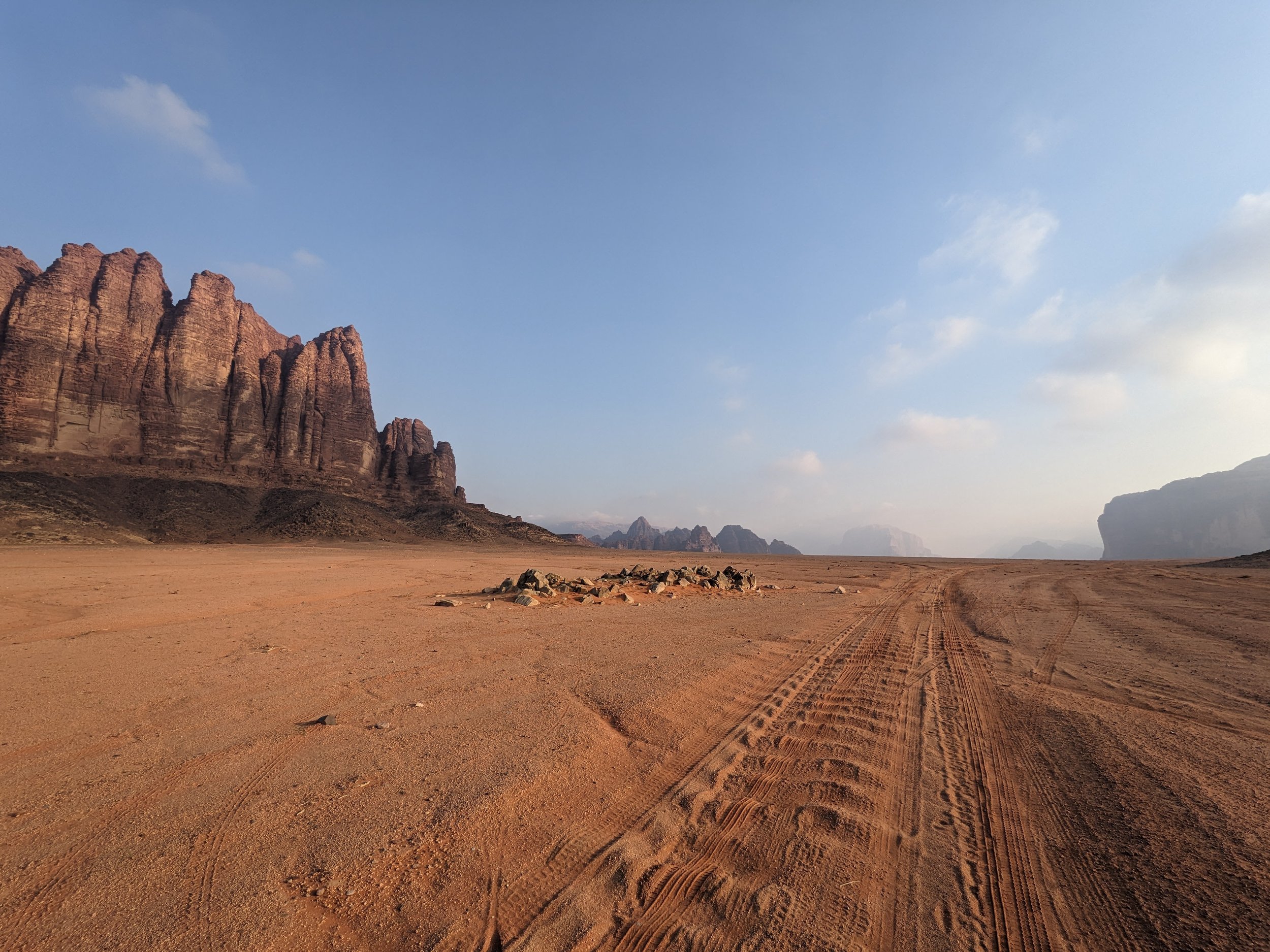How we ended up in Jordan
Written by: Charlotte Inman
The Jordan bike trail is a bikepacking route, that runs the length of Jordan. It connects over 700km miles of dirt trails, singletrack, and backroads, starting at Jordan’s northern border with Syria, and finishing at the Red Sea at Aqaba. Along the way, it passes by iconic places such as Petra, the Wadi Rum Desert, and the Dead Sea.
I first heard about the route when searching for inspiration for my first solo bikepacking trip in spring 2019, finding a write up of the trail on bikepacking.com, Promising “legendary hospitality” and accompanied by stunning photos of gravel roads curving into an endless desert, stunning sunsets, and wild barren landscapes, I was hooked in.
Digged deeper into the trail, I found an official website for the trail, jordanbiketrail.com, a brilliant resource, doing everything it can to equip people with all the info they would need to take on the trail independently. The trail was broken into day long stages, with stats on daily mileage and elevation, resupply points, and even local contacts for homestays and camping. It was clear that whoever was behind the design of the trail was truly passionate about encouraging people to come to Jordan, and to explore it by bike.
A small comment hidden in the FAQs of the website, discouraging women to cycle solo, helped to swing my choice of destination for that first big solo bikepacking trip in favour of the Baja Divide. But I logged the trail firmly on my bucket list, and promised myself to revisit it when I was a more confident rider.
Fast forward 5 years, via one worldwide lockdown and the start of Sisters in the Wild, Jordan came back on my radar as I started to see and hear more about people travelling there for adventure holidays. We’d begun to run more Sisters in the Wild trips overseas, starting with Spain and then Slovenia, and I wondered if Jordan could be a potential option for a unique, challenging and off the beaten track trip.
I knew that we’d need local help to make it happen, and got in touch with Experience Jordan, the team behind the design of the trail, and also a small local company running adventure travel trips in Jordan. My vision was that we’d get some help with logistics, maybe a support vehicle, but that, like our other SITW trips, we’d have our own female guide team leading it.
Anton didn’t hesitate to jump on the phone with me to chat more about the trail, excited by our suggestion of bringing an all female group. “I think we have never done this for cycling, only for our hiking trips”, and explained to me the rules and laws around tourism and adventure travel in Jordan.
“There are special rules in place that mean all group adventure travel in Jordan, must be run in partnership with a licensed local company. As a country, we’re really trying to promote active and adventure travel as a sustainable source of tourism growth, and cycling guides must have a special type of government authorised qualification that allow them to guide in the country. And they must be Jordanian!”
Though this would be a different set up to our normal trips, the idea of having a local female cycling guide actually sounded pretty awesome. What a great way to get to know the country from a local’s perspective.
“It’s a great idea” Anton said “but….there has not yet been a single female who has gone through the Cycling Guide qualification process”.
Damn, I thought. This felt like we’d hit a wall, and that the Jordan trip idea would be off the table. I considered our SITW principles, a core one being to create paid work for skilled female guides and mechanics. I also considered the work we do to create safe and supportive spaces on our trips, through having an all female & non-binary team that reflects our community.
Anton and I talked about the reasons for there being no women who had yet gone through the process of becoming a qualified guide, in all the years the system had been in place. “We have some incredible female guides in our team, but they all only do hiking. We haven’t had anyone interested to get into cycling.”.
My first reaction was to jump to discrimination and there not being opportunity created for the women. But of course, like in most conversations about representation, there were many sides that I hadn’t considered.
We talked about the fact that very few women even ride a bike, let alone be at the level to be a guide. About how cycling was not a big part of the Jordanian culture and free time, even for men, so the jump for a girl to see themselve as a professional MTB guide was huge. There were cultural and social norms to consider, of what is a “mans” vs a “womens” job, but also the reality that actually, the idea of getting sweaty and dirty may not be that appealing to many women, who take pride in their appearance. There was the fact that most women in Jordan are Muslim, and choose to dress conservatively, often with a Hijab. Then there was the cost and time of the qualification, and the need to be dedicated to that as a career choice.
Over the next few days I thought about and reframed our conversation and the challenge presented. I wondered if, actually, the presence of a group of strong and independent women and non-binary folks riding bikes through the country, could inspire women that saw us to consider cycling as something they could do too.
I wondered if rather than writing off the trip because we would need to have men in the team, we could just ensure we found the RIGHT men to work with, who also believed that a future with more female cycling guides would be a better one for everyone. More women would come to ride bikes in Jordan, which would be good for the tourism economy and image. And in turn, a few local women may just be insirpired to build their skill levels to the point that they could be excellent guides.
I’d trusted Anton implicitly from our first conversation. The passion he had for Jordan, and for wanting to share it with as many people as possible was contagious, and I knew that we’d found the right people to do this with.
A few months later, I headed to Jordan on a solo reccy trip to scout the route and check it would be appropriate for our riders. Armed with lots of tips and advice from Anton, (and his 24hr a day support on whatsapp!) I rode the southern section from Madaba to Aqaba, with an impossible to miss detour via the Dead Sea.
The route was everything I’d hoped it would be, and the hospitality beyond anything I could have imagined. I thought back to that comment that had deterred me the first time, and realised I’d actually rarely felt safer as a female cycling alone, Whether it was local Bedouin shepherds inviting me for tea, or a guesthouse host driving me to get my bike fixed, or a jeep unexpectedly waiting for me in the desert to check I had water, every encounter I had was positive and made me fall in love with the country even more. The wild riding and the incredible landscapes just sealed the deal.
And so we launched our trip in September 2023. Along with Experience Jordan, we decided to launch a bursary fund together to support a female guide through their guide training and qualification. Part of our trip proceeds would go into the pot, with the hope that after a few SITW trips, we would be able to share stories with local students, and perhaps find just one, that wanted to take a leap into the unknown. We knew it wouldn’t be a quick soluton, but hoped it might give that girl who might just consider it as an option, a little incentive and help to go for it.
Soon after our trip launched, the awful events in Israel and Palestine began to un-fold. Our first instinct was to cancel the trip, both due to the uncertainty about safety in the region, and because riding bikes for fun whilst knowing the atrocities happening across the border, just felt wrong.
But Jordan is a safe place to visit, full of warm and inviting people, many of whom rely on tourism for their livelihood. 20% of the population is Palestinan, many refugees who have taken on citizenship to try to create a life for their family in Jordan. It's those people that I met last year, some with friends and families impacted in ways we can’t even imagine, who had helped me through the snow and mud and bike fails on my recce trip.
Working closely with Experience Jordan, and keeping an eye on FCO travel advice, we decided that going ahead with the trip was the best thing we could do to support them, and a fragile tourism economy that was down 90% on the previous year.
It’s a complicated and complex decision, and one we’ll keep revisiting as we get ready for our return to Jordan in November. But the extra warm welcome we received from locals impacted by the huge drop, and the emptiness of tourist sights like Petra, made us feel a responsibility to help encourage people to visit. Our inbox is open if you have any questions, or we can connect you with locals to connect with to help you plan your journey.
Feel free to get in touch, and look out for a write up of how our first trip went, coming soon.








